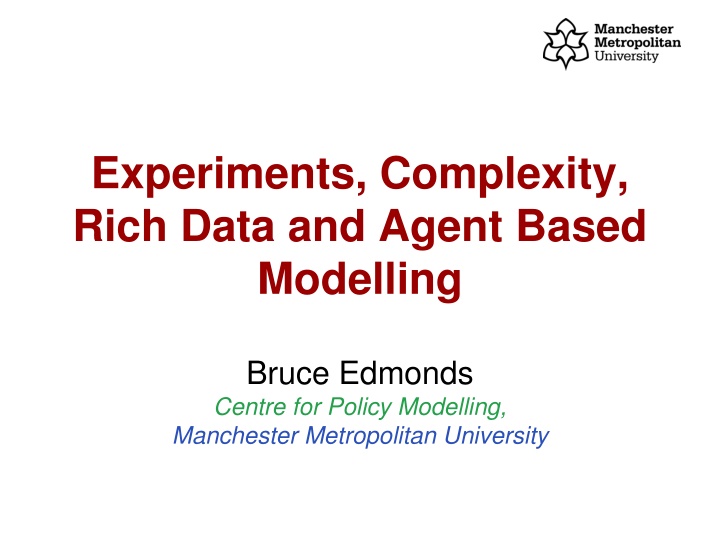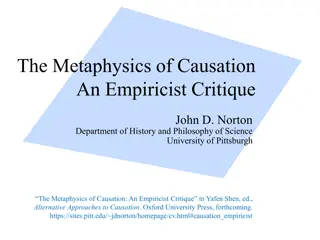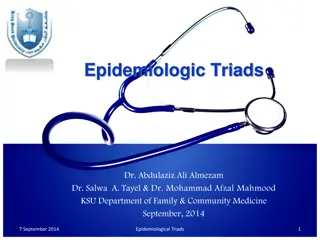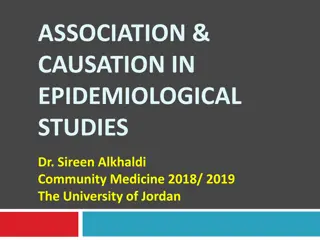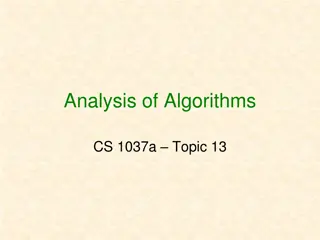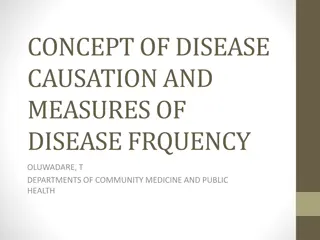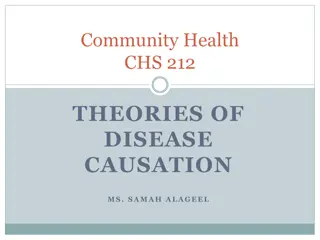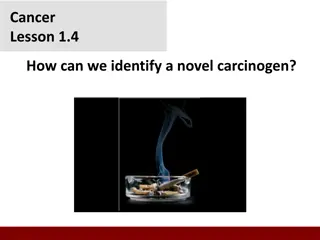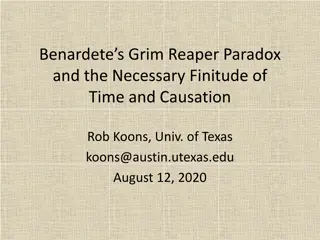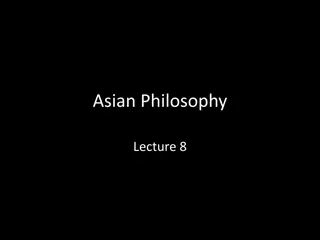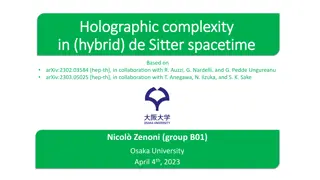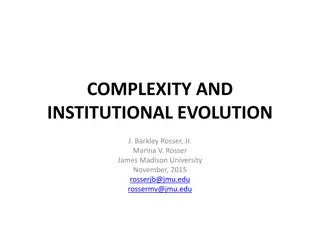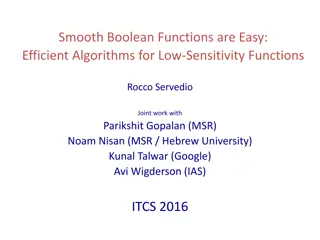Complexity in Causation: Understanding the Challenges
Causation is a complex concept that is often difficult to prove, especially in observed and complex systems. Traditional experiments and agent-based modeling offer different approaches to studying causation in diverse systems, highlighting the challenges and opportunities for advancing our understanding of causality in various contexts.
Download Presentation

Please find below an Image/Link to download the presentation.
The content on the website is provided AS IS for your information and personal use only. It may not be sold, licensed, or shared on other websites without obtaining consent from the author.If you encounter any issues during the download, it is possible that the publisher has removed the file from their server.
You are allowed to download the files provided on this website for personal or commercial use, subject to the condition that they are used lawfully. All files are the property of their respective owners.
The content on the website is provided AS IS for your information and personal use only. It may not be sold, licensed, or shared on other websites without obtaining consent from the author.
E N D
Presentation Transcript
Experiments, Complexity, Rich Data and Agent Based Modelling Bruce Edmonds Centre for Policy Modelling, Manchester Metropolitan University Experiments, Complexity, Rich Data and Agent Based Modelling, Bruce Edmonds. Experiments and ABM, Social Simulation, September 2021, 1
Causation Causation is, traditionally, something we infer from the mess of events we observe It is usually invoked at the level of macro-level explanation/theory: A causes B Examples: Smoking causes cancer Printing too much money causes inflation Many variations and formalisations exist but all say whether A happens effects whether B happens there is a traceable, communication process from A to B Experiments, Complexity, Rich Data and Agent Based Modelling, Bruce Edmonds. Experiments and ABM, Social Simulation, September 2021, 2
The Trouble with Causation is that 1. It is hard to prove in observed systems 2. It is difficult to apply in complex systems a) Any derived causal statement about them is so dependent on assumptions and conditions that the notion is not very useful b) It is hard to justify singling out any particular causal chain from all the other ones Yet we want some human-comprehensible explanations of why outcomes occur Other ways of doing explanation (mechanisms, laws etc.) have similar issues Experiments, Complexity, Rich Data and Agent Based Modelling, Bruce Edmonds. Experiments and ABM, Social Simulation, September 2021, 3
Traditional Experiments constrain reality so that the effect of the hypothesised cause can be varied but other factors controlled, so the effect (or measures indicating this) are observed One is simplifying reality in order to test a causation, under the assumption that the causation still occurs in the wild (but where it is hard to prove) Such experiments assume there is some reachable simplicity in these systems worth testing in this way Process is optimized to provide as much power of the results and the discrimination between factors Experiments, Complexity, Rich Data and Agent Based Modelling, Bruce Edmonds. Experiments and ABM, Social Simulation, September 2021, 4
In Agent-Based Modelling We directly program (usually micro-level) causation into the ABM (except when we deliberately break this with random choices) and then observe and summarise the simulation outcomes we deem significant The ABM allows us to leverage some indirect understanding it is an object of intermediate complexity that allows us to make human- levels explanations about the ABM Experiments on the ABM to find what causes its significant outcomes are more feasible Experiments, Complexity, Rich Data and Agent Based Modelling, Bruce Edmonds. Experiments and ABM, Social Simulation, September 2021, 5
An example of Causal Spread in an ABM Each line indicates a causal link in behaviour, each box an agent at successive simulation ticks (Edmonds 1999) Experiments, Complexity, Rich Data and Agent Based Modelling, Bruce Edmonds. Experiments and ABM, Social Simulation, September 2021, 6
The central issue about experiments Experiments (at least those in the traditional mode) seek to show simple causation This is not very useful in complex systems we need to represent more of its complexity But experiments, typically, also produce relatively thin data about what is happening, which is not enough to build or validate an ABM because it is too constrained Traditional theory+experimentation was conceived for a simpler way of thinking Experiments, Complexity, Rich Data and Agent Based Modelling, Bruce Edmonds. Experiments and ABM, Social Simulation, September 2021, 7
Beyond experiments To make a good, empirically-grounded ABM we need: The situations to range over the right amount of possible cases not too simple, but not the full mess of what is in the wild We need rich data about lots of aspects of what is happening at all levels (micro, meso, macro) including interviews about, or traces of, how actors are thinking And then re-apply the ABM to new cases to assess its adequacy and what it misses Experiments, Complexity, Rich Data and Agent Based Modelling, Bruce Edmonds. Experiments and ABM, Social Simulation, September 2021, 8
Conclusions Traditional experiments are not so useful for understanding complex systems or for producing the kind of data/evidence that ABMs need but it is useful to partially constrain reality to make modelling more feasible and to collect as much data and as many kinds of data as possible, so game formats are good Remember to interview your participants about why they made their decisions!! Experiments, Complexity, Rich Data and Agent Based Modelling, Bruce Edmonds. Experiments and ABM, Social Simulation, September 2021, 9
